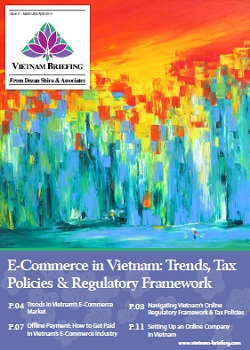E-Commerce in Vietnam: Trends, Tax Policies and Regulatory Framework – New Issue of Vietnam Briefing Magazine
 The new issue of Vietnam Briefing magazine, titled “E-Commerce in Vietnam: Trends, Tax Policies and Regulatory Framework“, is out now and available as a complimentary download in the Asia Briefing Bookstore.
The new issue of Vietnam Briefing magazine, titled “E-Commerce in Vietnam: Trends, Tax Policies and Regulatory Framework“, is out now and available as a complimentary download in the Asia Briefing Bookstore.
Contents
- Trends in Vietnam’s E-Commerce Market
- Offline Payment: How to Get Paid in Vietnam’s E-Commerce Industry
- Navigating Vietnam’s Online Regulatory Framework and Tax Policies
- Setting Up an Online Company in Vietnam
The speed of change in Vietnam can leave you breathless. From 2013 to 2014, the proportion of shoppers buying electronics online almost doubled. The phenomenal opportunities in this frontier market are here for those who come prepared.
Always bear in mind that this market is price-sensitive. High-end retailers have found success, but the largest market is the low-middle income segment of the population, and getting to know their spending habits is vital. The country’s new consumer class has an appetite for clothes, shoes, cosmetics and electronics. Vietnam’s internet users are young, online mostly in the evenings, and are more likely to access the internet via a laptop or cell phone than a desktop computer. Successful businesses tailor their websites to meet these needs.
 RELATED: Dezan Shira & Associates’ International Tax Planning Services
RELATED: Dezan Shira & Associates’ International Tax Planning Services
In this issue of Vietnam Briefing Magazine, we aim to provide readers with a complete understanding of Vietnam’s e-commerce industry. We begin by highlighting existing trends in the market, paying special attention to scope for foreign investment. We then look at the most common means for online sellers to receive payment in Vietnam, and examine the industry’s tax and regulatory framework. Finally, we conclude by discussing how a foreign retailer can actually establish an online company in Vietnam.
Doing business in Vietnam requires close interaction with the government, and e-commerce is no different. Before selling to Vietnam, government approval is required, and selling unapproved products can land you in hot water. This is why professional advice is always needed.
|
About Us Asia Briefing Ltd. is a subsidiary of Dezan Shira & Associates. Dezan Shira is a specialist foreign direct investment practice, providing corporate establishment, business advisory, tax advisory and compliance, accounting, payroll, due diligence and financial review services to multinationals investing in China, Hong Kong, India, Vietnam, Singapore and the rest of ASEAN. For further information, please email vietnam@dezshira.com or visit www.dezshira.com. Stay up to date with the latest business and investment trends in Asia by subscribing to our complimentary update service featuring news, commentary and regulatory insight. |
Import and Export: A Guide to Trade in Vietnam
In this issue of Vietnam Briefing Magazine, we provide you with a clear understanding of the current business trends related to trade in Vietnam, as well as explaining how to set up your trading business in the country. We also attempt to give perspective on what will be Vietnam’s place in the Association of Southeast Asian Nations (ASEAN) in 2015, and look at some of the country’s key import and export regulations.
 Using Vietnam’s Free Trade & Double Tax Agreements
Using Vietnam’s Free Trade & Double Tax Agreements
In this issue of Vietnam Briefing we explore how Vietnam’s Free Trade Agreements – and especially those via its membership in ASEAN – will affect foreign investment into Vietnam. We also go a step further and examine the specific, bilateral Double Tax Agreements that Vietnam has enacted, and how these can be further used to minimize profits and withholding taxes that would otherwise be levied upon foreign investors.
 Developing Your Sourcing Strategy for Vietnam In this issue of Vietnam Briefing Magazine, we outline the various sourcing models available for foreign investors – representative offices, service companies and trading companies – and discuss how to decide which structure best suits the sourcing needs of your business.
Developing Your Sourcing Strategy for Vietnam In this issue of Vietnam Briefing Magazine, we outline the various sourcing models available for foreign investors – representative offices, service companies and trading companies – and discuss how to decide which structure best suits the sourcing needs of your business.
- Previous Article Da Nang Looks set to be the Singapore of Vietnam
- Next Article Yarn Forward’s Effect on the Trans-Pacific Partnership and Vietnam










